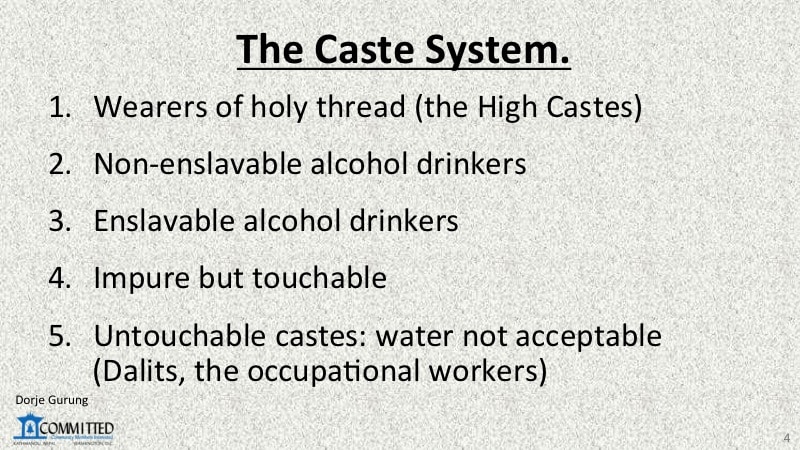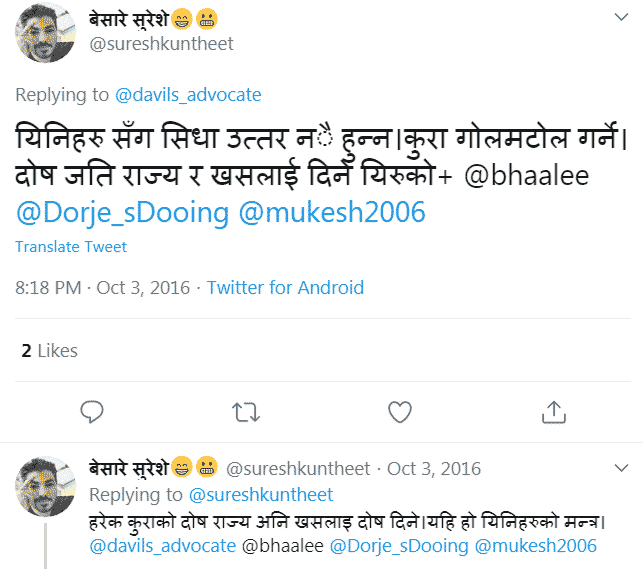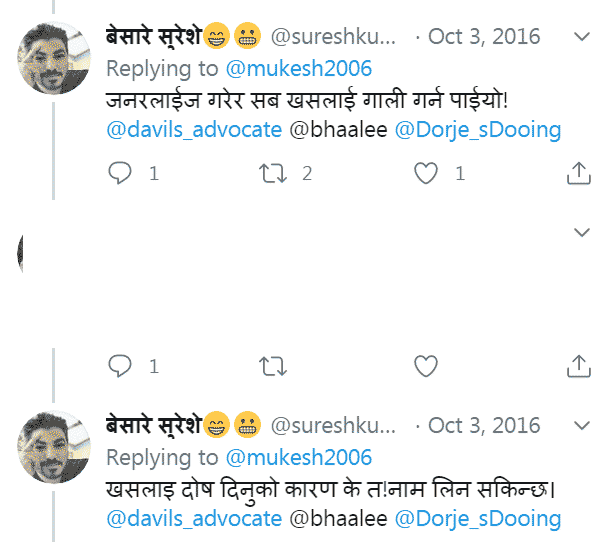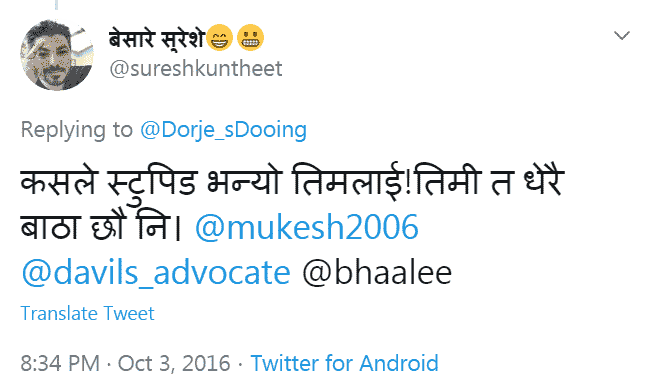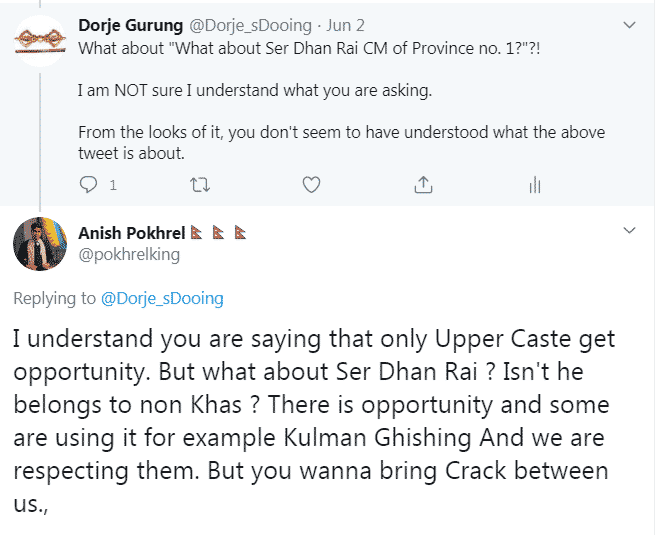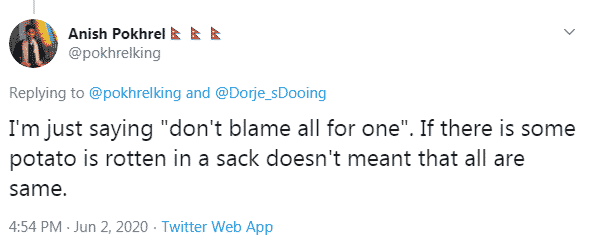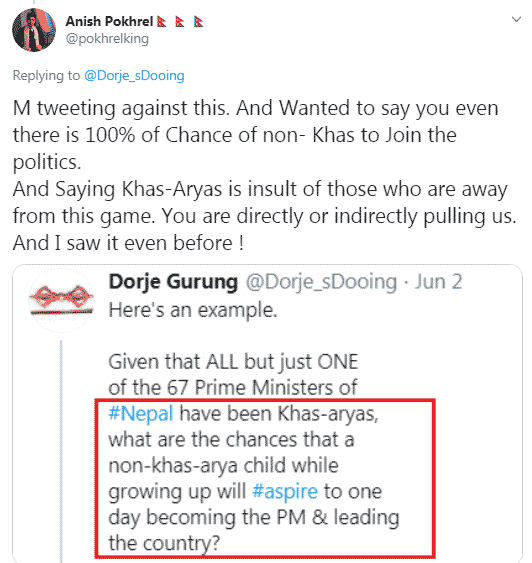One of the many reasons behind the hill so-called high caste Hindu Nepalis placing everyone else under them in the Hindu social system was their belief in the multitude of indigenous peoples being “inferior” to them for different reasons and in different ways.
The system, called the caste system (see image below), was legitimized in the blatantly and highly discriminatory 1854 Muluki Ain (The Law of the Land).
We have no shortage of hill so-called high caste Hindus who look down on indigenous people — whether consciously (because they have learned and internalized the belief that they are indeed superior) or unconsciously (through acculturation) — especially on someone like me.
As an ethnic Tibetan (Bhote in Nepali), I belong to the third caste, to the enslavable alcohol drinkers. One reason may be because we are “yak eaters” (see below). Yaks, to Hindus, are equivalent to cows, a sacred animal!
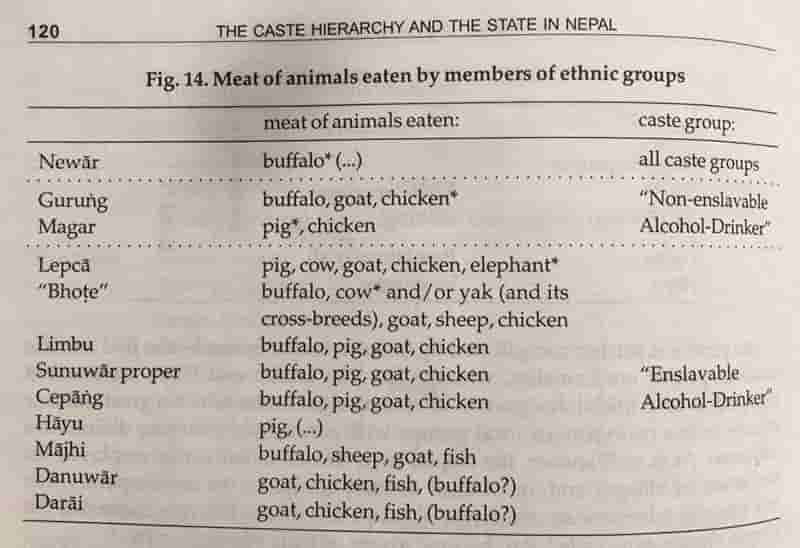
This article in Nepali language (Khas-kura) describes in detail why even the so-called “progressives” among the hill so-called high caste Hindus struggle to practice what they preach when it comes to the question of caste.
In the years since returning to Nepal (in 2013), I have been heavily involved in social justice issues, among other things. I have blogged a lot. I have collated and published data exposing the structural issues our country suffers from. I have written on the importance of, the value in, and the benefits of inclusion and diversity. I have also written on gender equality etc.
I have also had discussions with fellow Nepalis both face-to-face and on social media on caste and other topics, including the highly warped systems and structures which disproportionately benefit the Khas-aryas, more specifically the men.
Over the years, I have received different reactions to my writings and opinions on that. One I have gotten from mainly Khas-aryas is essentially, “Why are you blaming us for that?”
So, to begin with, what follows are some examples of fellow Nepalis accusing me of “pointing fingers” at them. I’ll follow that up with my own theories for why they do that.
Incidentally, this time around, I haven’t bothered to redact the names and handles of many users because all the exchanges are in the public domain and accessible to anyone and everyone.
Here’s the first one from way back in September 2016. It’s from a hill so-called high caste Hindu man, a Nuclear Fuel Engineer, who lives in the US. I can’t link you to the original tweet under which this exchange took place since he appears to have deleted it.
.@SanuBhatta_ I must b a dumbf%#+ then. Cuz I help Khas children while blaming Khas ppl! @patansoup @mukesh2006 pic.twitter.com/t5hI5qVLV9
— Dorje Gurung, ScD (h.c.) (@Dorje_sDooing) September 28, 2016
.@SanuBhatta_ But of course, u have a perfectly good explanation! I was just “boasting” @patansoup @mukesh2006 + pic.twitter.com/u9p8812tuw
— Dorje Gurung, ScD (h.c.) (@Dorje_sDooing) September 28, 2016
.@SanuBhatta_ I must be schizophrenic! Someone plz call the doctor!! 😂 😂 @patansoup @mukesh2006
— Dorje Gurung, ScD (h.c.) (@Dorje_sDooing) September 28, 2016
The following also comes from about four years ago.
I shared, on Facebook, a chart showing the breakdown of a number different bodies in Nepal by caste to dramatically show how warped our structures are. The chart got shared by a number of different users, like this guy. And under his share, I found the following comment by a Khas-arya man.
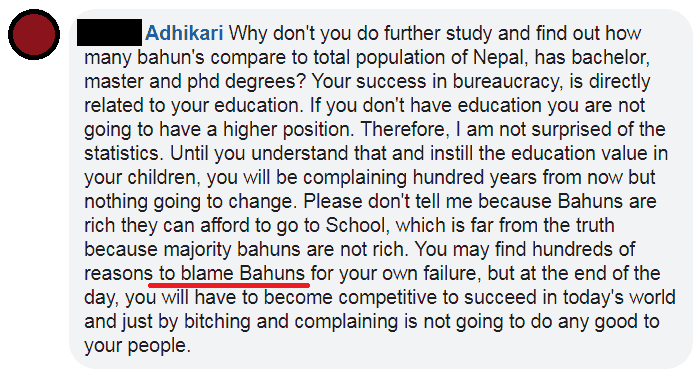
The following is from October 2016. Realizing that the user didn’t seem to have an understanding of privilege and structural issues plaguing the country, I made three tweets linking to blogs on the topic. Except, another user came back with the following tweets (see image below).
In the first one he says, “They won’t have straight answers. [They] twist the arguments. They put all the blame on the State and the Khas [high caste].” In the second tweet, he adds, “[They] blame the State and Khas for everything. That is their mantra.”
Getting directly to the point, I responded saying, “Oh, I just realized why the likes of you would like to continue to believe we are stupid!” I followed that up saying, “Then you can continue to justify occupying the corridors of power in the country.”
.@sureshkuntheet Oh, I just realized why d likes of u wud like 2 continue believing we r stupid! @davils_advocate @bhaalee @mukesh2006 +
— Dorje Gurung, ScD (h.c.) (@Dorje_sDooing) October 3, 2016
.@sureshkuntheet + Then u can continue to justify occupying the corridors of power in the country! 😂😂😂@davils_advocate @bhaalee @mukesh2006
— Dorje Gurung, ScD (h.c.) (@Dorje_sDooing) October 3, 2016
He comes back with these. “[You can] generalize and blow off all Khas people.” And in the second tweet he asks, “What is the reason behind [your] blaming the Khas. [sic] Can you spell it out. [sic]”
As far as I could tell, he hadn’t understood what I had said in the preceding tweets.
So I respond by asking, “So you still think that we are as stupid as you think?” In a follow-up tweet, I further asked, “All you see in our discourse is BLAME! Would asking for evidence be asking too much?”
.@sureshkuntheet So u still think that we r as stupid as u think? @mukesh2006 @davils_advocate @bhaalee
— Dorje Gurung, ScD (h.c.) (@Dorje_sDooing) October 3, 2016
.@sureshkuntheet All u c in our discourse is BLAME! Wud asking 4 evidence b asking 2 much? @mukesh2006 @davils_advocate @bhaalee
— Dorje Gurung, ScD (h.c.) (@Dorje_sDooing) October 3, 2016
Clearly, he hadn’t understood what I had hinted at when I had repeated that he might still be assuming we were as stupid as he thought. He comes back with, “Who called you stupid! You are very intelligent.”
.@sureshkuntheet Kasle Khas-arya lai dosh diyeko chha ta? @mukesh2006 @davils_advocate @bhaalee
— Dorje Gurung, ScD (h.c.) (@Dorje_sDooing) October 3, 2016
.@sureshkuntheet Structure of bare kura gareko ta Khas-arya lai dosh diyo bhanchhau ta! @mukesh2006 @davils_advocate @bhaalee
— Dorje Gurung, ScD (h.c.) (@Dorje_sDooing) October 3, 2016
So, in a series of tweets, I laid it down as clearly as I could what I had been trying to tell him.
.@sureshkuntheet D simplest explanation 4 what & why we r talking abt structural issues. @mukesh2006 @davils_advocate @bhaalee
— Dorje Gurung, ScD (h.c.) (@Dorje_sDooing) October 3, 2016
.@sureshkuntheet And in assuming that, u have made given away what & how u think of us. @mukesh2006 @davils_advocate @bhaalee
— Dorje Gurung, ScD (h.c.) (@Dorje_sDooing) October 3, 2016
.@sureshkuntheet By assuming we were playing d blame game, u revealed u think we r small minded. @mukesh2006 @davils_advocate @bhaalee
— Dorje Gurung, ScD (h.c.) (@Dorje_sDooing) October 3, 2016
.@sureshkuntheet + we can’t think beyond d obvious, that of blaming the Khas-aryas, 4 all our issues. @mukesh2006 @davils_advocate @bhaalee
— Dorje Gurung, ScD (h.c.) (@Dorje_sDooing) October 3, 2016
.@sureshkuntheet Do u know what that tells us about you? 😊😊@mukesh2006 @davils_advocate @bhaalee
— Dorje Gurung, ScD (h.c.) (@Dorje_sDooing) October 3, 2016
He didn’t respond to any of that. Who knows why. 😀
The following one comes from April 2017. The man says, “Look within for reasons behind your failures. Progress cannot be made by putting the blame on another gender, caste, language, religion, society, State etc.”
This again is funny!! Clueless abt #StructuralIssues in ur society, this discussion, he thinks, is abt d “blame game”! LOL!! pic.twitter.com/UuEEF7QfcU
— Dorje Gurung, ScD (h.c.) (@Dorje_sDooing) April 16, 2017
The following hill so-called high caste Hindu man (who is actually a school mate) felt that protesting symbols of suppression and oppression, such as Dassain, was “pointing fingers.”
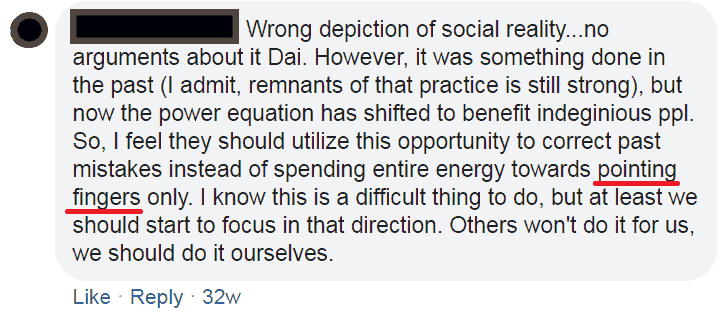
Here’s another one, from last month, also from a hill so-called high caste Hindu man. It started with a tweet referencing a person but that tweet has since been deleted. However, I quote the content of that tweet in my own response below. (The exchange took place under a tweet of mine about the capacity to aspire of indigenous Nepalis.)
His response to my tweet above was to accuse me of trying to “bring crack between us [Nepalis],” which is something I have been accused of doing by others too.
Not understanding what he was on about, I tweeted saying just that.
His response was to say, ‘”don’t blame all for one.” If there is some potato rotten in a sack, doesn’t meant that all are same.’
Again, realizing that he hadn’t understood anything I was tweeting in the context of the topic — the lower capacity of non-Khas-arya children to aspire to certain posts, positions, and careers etc. — I responded essentially asking him where his statement came from.
Then he comes back with a tweet including an image of one of my earlier tweets with a red box around the part he was objecting to.
And of course, I had to point out the ridiculousness of it all.
He did not respond to that, which was just as well, of course. Again, who knows why. 😀
The above are just some examples from my exchanges with others on social media. Of course, I have also had that in face-to-face interactions. Additionally, I have seen this in exchanges between others on social media too.
As you might have noticed, those who go on the offensive that way, are a motley bunch. I put such hill so-called high caste Hindus in one of six camps, as it were.
Those I put in the first camp are the insecure and thin-skinned ones. They take personally anything that appear to be, or they interpret as, an attack on or negative portrayal of anything connected to — or about — their identity, however loosely.
Those who belong to the second camp are the ones who have a low opinion of the likes of us. Viewing us as inferior, they can’t imagine — or believe in — us being capable of higher purpose in our thoughts, attitudes, beliefs, behaviors, and actions.
Those in the third camp are the uneducated ones. They haven’t been taught and therefore don’t know that the structural issues plaguing the country is a legacy of the casteist history of the country — forget about the role their ancestors played in that history. As a matter of fact, they very likely believe that the history of the country is actually “all glorious and all Nepalis live in social harmony.”
In the fourth camp are the lazy ones. They accuse us of being petty and blaming them for the structural issues because it’s the easier option. Doing so obviates the need for them to think about it at all.
In the fifth camp are the really really stupid and dumb ones. They are the ones who are so stupid and dumb that they view us as being just as stupid and dumb as they are. They are likely not aware of that however; they are after all really stupid! Unable to imagine themselves thinking, saying or doing anything intelligent or sensible etc. were they in our shoes, they are convinced that the only things we are capable of saying and doing etc. about the structural issues plaguing the country are only what they themselves are capable of!
In the sixth and the last camp are those who know and understand exactly what we are doing AND may even feel shame over everything their ancestors have done etc. But arrogance prevents them from admitting to that. Instead they decide to discredit us by belittling us, or by questioning or denouncing our motive, or by insulting our intelligence and intellectual integrity etc.
In Nepal, even those in the highest leadership positions take the path of least resistance. Far from taking responsibility for consequences of their actions or inaction, Oli, our Prime Minister, for example, has been pointing fingers at everyone else for the utter failure of his government in their handling of the coronavirus pandemic and all other related issues except his cabinet, the high level committee, and himself. Most recently, he blamed India for the calls to resign from the premiership.
The best reaction from the structurally privileged in the country, when people like us from other castes point out systemic and structural issues the country suffers from, is, however, to LISTEN! Then we could, in theory, work together to establish a more just and equitable society.
And finally, a disclaimer: I am not suggesting that ALL or even most hill so-caste Hindus go on the offensive like so whenever they encounter an opinion that they might interpret as an “attack” on their caste.
What do you think?

